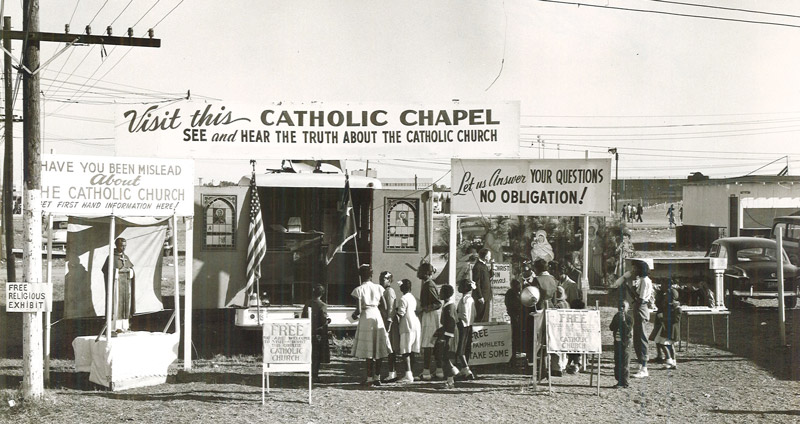
KINGSTREE—An afternoon trip down a country road in April led to the unexpected rediscovery of “the church on wheels” — a genuine piece of history that many people thought was lost forever.
The Foyle family of Lake City took a different route than usual on their way to the Shrine of Our Lady of South Carolina — Our Lady of Joyful Hope on Divine Mercy Sunday. Charlie Foyle, 17, was looking out the window of their truck when he saw something unusual.
“Look! A truck with Gothic windows!” he yelled to his family. They turned off the road and drove to the edge of a field past an empty house where the unusual vehicle sat. Charlie and his parents, Chet and Andrea Foyle, immediately recognized the rusted-out structure from historic photos they’d seen.
It was the long-lost mobile church, a converted 18-wheeler that was once used to evangelize in rural Williamsburg County and other parts of the state from 1949 until 1967.
 Dominican Father Patrick Walsh used to drive hundreds of miles with the church on wheels, which included an altar, pews, and even a confessional. He set up at rural crossroads, state fairs and in other places to teach people about Catholicism in a state where they were a distinct minority.
Dominican Father Patrick Walsh used to drive hundreds of miles with the church on wheels, which included an altar, pews, and even a confessional. He set up at rural crossroads, state fairs and in other places to teach people about Catholicism in a state where they were a distinct minority.
The Foyles quickly headed for Kingstree to tell Father Stanley Smolenski, spma, shrine director, about their discovery.
He needed to be the first to know, they said, because Father Smolenski was part of its history. Beginning in 1957, he spent 18 months traveling the state’s country roads with the church on wheels. At the time, he was a Dominican brother and said his experience evangelizing with Father Walsh led him to pursue a vocation to the priesthood instead.
“For me personally, this find was like discovering the Hunley,” the priest said in a recent interview, comparing the church on wheels to the famous Confederate submarine which was missing for may years before its discovery off the coast of Charleston in 2000.
He will never forget seeing the chapel again as it sat in the grove of trees.


“It was like a flashback of 50 years ago,” Father Smolenski said. “I saw the open side door and I could see the people filing out … like they used to do. It was like a movie. I used to stand out front of the mobile church and invite people in. It was like being a barker for the Lord.”
Jim McLaughlin, a historian and writer based on Folly Beach, has been working for several years on a book about Father Patrick Quinlan’s ministry in the Williamsburg County area. He said Father Quinlan, who was based at what was then St. Ann Church in Kingstree, was contacted by Father Walsh in 1949.
Father Walsh was working at St. Martin de Porres in Columbia and became interested in a group of priests touring rural areas of North Carolina and Georgia with a mobile altar set up on a trailer.
“Going one better, Father Walsh obtained a used 18-wheeler truck and converted it into a motor chapel,” McLaughlin wrote. “Now he was looking for rural parishes that would buy in on the concept of using his unique vehicle to evangelize large areas. Father Quinlan was his first sales call, and it was a successful one.”
McLaughlin said that Father Walsh, who moved to Kingstree, would take the mobile chapel to small communities and introduce the faith to people there.

Father Quinlan and his small team of volunteer catechists would then follow up by offering classes to people in far-flung areas. Since many of the people he taught did not have cars, Father Quinlan went to them and taught wherever he could, including abandoned stores, garages and even a rented former dance hall. Over the years, he eventually established four rural chapels on rented land.
Anti-Catholic prejudice was rampant in many areas in those days, and Father Quinlan and his volunteers were harassed several times by the Ku Klux Klan. On one occasion, someone shot holes through a movie screen when they were showing films about Christ and the Church, McLaughlin said.
Father Walsh returned to his order in 1966 and the mobile ministry faded out in 1967. Eventually, people lost track of the vehicle that had helped so many learn about the Church, McLaughlin said. No one knew where it had ended up until the Foyles made their discovery.
The family who owns the property where the mobile church was found have lived up north for many years, but said they are willing to let the chapel be moved.
Update: As of early May 2018, the mobile chapel remains where it was found, according to Father Smolenski. He has been in talks with diocesan officials, and hopes the historic little church on wheels will eventually be moved to another site outside Kingstree, where the late Father Quinlan is buried. There, it could serve as a museum and a reminder of the huge efforts that Fathers Quinlan and Walsh made to share their faith.




